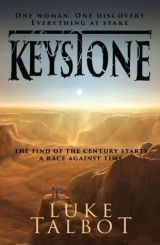
Текст книги "Keystone"
Автор книги: Luke Talbot
Жанры:
Триллеры
,сообщить о нарушении
Текущая страница: 29 (всего у книги 36 страниц)
“Before I saw the Book of Xynutians this week, I only had ideas. Now, I have the actual truth,” she said, deflated. Up until now she had been denying the evidence fed to her by Patterson and Mallus, but now there could be no mistaking the message in the small room under the staircase.
Suddenly, the torch switched itself off; a heartbeat later it came back on again. The momentary darkness made everyone jump.
Walker seized the torch and inspected it. “There’s enough battery left for another eight hours,” he claimed, after checking the charge. But no sooner had he finished his sentence than they were again plunged into darkness for good.
“Shit!” he exclaimed among the cries of the others.
In the pandemonium, Gail had a vivid recollection of her dream when she was kidnapped, of being helplessly stuck in the darkness. She felt a tingle down her spine, as if the lack of light had taken all warmth from the air.
After what seemed like an age, but what could in reality barely have been a few minutes, a thin blade of blinding white light appeared at the bottom of the wall. Within seconds the wall had disappeared into the ceiling, and they were shielding their eyes as they tried to see what had been revealed.
Gail, still on her knees where she’d been facing the Xynutian engravings, squinted into the light. At first all she could make out was a straight corridor, the light coming from strips along the ceiling and walls. As her eyes became more comfortable, the strips split up into single points, and she saw that the corridor was illuminated with thousands of small dots of very bright white light, like the solitary LED at the top of the stairs. They led down the corridor, deeper underground; to a dead end that she guessed must also be a door.
Walker recovered first, and strode into the corridor towards it. Ben hesitated, pistol in hand, on the threshold. Gail looked up at Patterson.
“Henry, this is all very familiar,” she said slowly, thinking of the astronauts trapped behind the door on Mars.
He nodded and started walking into the corridor. “It is, and I know what you’re thinking, but we don’t really have a choice: the air in here is turning stale and the flashlight has gone out.”
As he said it, she became all too aware of the acrid taste on her tongue from the low quality air they’d all been sharing. The hall they had entered was massive, but she knew that its oxygen content had been poor to start with.
“Feels fresher in here,” Walker said with an approving nod. “Just need to work out how this other door opens, but we’ve been doing well so far,” he joked.
Gail paused for a moment as she got to her feet. George was somewhere behind her, above her, and yet ahead and further down was the only possible route. The lack of torch and dwindling air supply made further exploration or even retreat impossible.
It was the only way forwards, and yet she couldn’t shake the feeling that there was something very final about going down the corridor. Nonetheless, she accepted Ben’s outstretched hand and joined him and Patterson inside. She was barely a few steps down the corridor, moving towards Walker, when she thought to look back at Akhenaten and Nefertiti.
What she saw terrified her.
The white light from the corridor had picked out the polished stone of their eyes. But instead of reflecting in the black of obsidian and blue of Lapis Lazuli, Akhenaten and Nefertiti were fixing her with blood-red eyes. Their peaceful smiles took on a whole new sinister dimension, and as Gail stared incredulously at their evil gaze, the door that led back to the Hall, back to the Library and back to George, slid closed, leaving them trapped in the corridor.
Chapter 75
During the mid-1980s, more than seventy thousand nuclear weapons existed in stockpiles maintained by the Americans and Russians. It is often quoted that the yield of those nuclear weapons was sufficient to destroy the world several times over, but that is poor imagery to help describe how such a cataclysmic event would take place.
In reality, a mere fraction of those nuclear arsenals would ever be deployed. After the first few hundred ICBMs had landed on foreign soil, there would be precious few people left alive who could even launch the remainder, and even fewer of whom would want to.
In 1991, the Cold War ended; on both sides of the border, no one had ever truly wanted to use the weapons they had created. The understood devastation of nuclear holocaust, the indiscriminate killing of millions of innocent people and the no-win situation that would arise from its aftermath ultimately spelled the end of the stand-off between East and West.
Nonetheless, in the post-Cold War era nuclear disarmament was both slow and unenthusiastic. The Russians, reeling from their own economic implosion, were unable to maintain their existing weapons, let alone decommission them. For its part, the West was particularly loath to take a large proportion of its nuclear arsenal off hair-trigger alert. Despite numerous attempts to pass resolutions through the United Nations, the United States of America, France and the United Kingdom persistently voted against the action.
This meant that several decades after the end of the Cold War, the old West maintained an arsenal of hundreds of nuclear weapons pointed at targets in the East that could effectively be launched in less than five minutes.
Then, on 28th July 2015, the Islamic Republic of Iran announced to the world that it had officially joined the elite club of nations in possession of nuclear weapons.
The announcement came not via the state media, nor from the network of foreign intelligence agents and informants who risked their lives on a daily basis to provide up-to-date reports on the country’s machinations, although the very existence of such networks did mean that few were surprised when the announcement finally came.
Instead, it came from the vaporisation of fifty square miles of desert and arid shrub-land in the South Khorasan region of the country, less than a hundred miles from Afghanistan. It was confirmed by satellite imagery, but such technology was not needed for the majority Kurdish population along the Afghan border, who saw the mushroom cloud hit the Earth’s stratosphere around about the same time the ground started to shake.
The show of strength caused international relations in the already volatile region to heat up considerably; particularly damaging was the face-off that ensued between Iran and its pro-West neighbours Pakistan and Afghanistan, with many skirmishes along Iran’s heavily fortified border causing tensions to rise dramatically within the UN.
India was critical of the militant stance taken by Pakistan in particular, and terrorist activity in the two countries increased. The governments blamed each other, but nonetheless decided to increase investment in their own already substantial nuclear deterrents.
While Pyongyang sent congratulations to Tehran, Moscow urged prudence on behalf of the world’s largest nuclear power. Israel was up in arms, stepping up air patrols and angering Iraq and Iran for infringing airspace with spy drones.
The announcement meant it was now theoretically possible, although practically less so, to travel by land from the Mediterranean to the Bay of Bengal or even the East China Sea without once having to set foot in a country that did not possess or have access to nuclear weapons.
The United States of America quietly slowed down existing disarmament programs, continuing to decommission warheads and delivery systems (that would in any case have belonged in museums) while installing ever more effective systems to support the warheads that would remain active.
At the same time, the President issued a stark warning to Tehran: “Nuclear Proliferation will not be tolerated,” he said with his hands firmly rooted to the podium at a press conference. “In cooperation with our international partners, the United States of America will strive to uphold the values that saw the end of the Cold War; the end of the nuclear arms race.”
In Tehran, they could read between the lines: Welcome to the club.
In 2045, nuclear weapons were still a deterrent; one that earned the owner greater respect, and made it far less likely you would ever be attacked. Everyone understood the destructive power of the technology and where it could lead the world.
And it would still take a complete maniac to actually use them.
The white utility vehicle turned left into a side alley connecting Franklin Street and White Street, a block away from Broadway, and came to a stop. The enticing smell from the Lafayette Grill kitchens made the driver’s mouth fill with saliva, but there was no time to pop in for a bite to eat. He’d have to grab a McDonald’s or a Burger King on his way out of New York by train.
He couldn’t remember which would be available at Penn Station, probably both. He would have half an hour or so before he hopped on the train to DC to make up his mind, as long as he could hail a cab and they didn’t get stuck in traffic.
Having already changed out of his overalls and into jeans and a shirt, he shouldered his gym bag and locked the doors. He also checked thoroughly for parking restrictions, and peered into the windscreen of another car parked on the same street to check for parking permits. He’d stopped where he’d planned to, of course, but he didn’t want to leave anything to chance. That’s why he’d been chosen for this job; not just that he understood the importance of getting it right, more importantly the consequences of getting it wrong. He also knew there were no surveillance cameras in this street, and the narrow alley made it very unlikely that any decent satellite imagery would be obtainable.
A police van drove slowly along White Street as he emerged into the sunlight. He carried on walking nonchalantly, ignoring the look from the officer riding shotgun. It was a long time since he’d been in New York, but it was pretty much like any big city in America: mind your own business, and everything’ll be just fine.
He jumped in a yellow cab and pointed up Broadway. “Penn Station, please.”
The driver grunted in reply and they seamlessly joined the lunchtime traffic.
Fifteen minutes later, he was sitting on a bench in the station, enjoying an early lunch of Triple Whopper, large fries and Coke. The slices of tomato slid out from under the bun as he tried to hold the burger together, biting small chunks from around the edges to get it somewhere near a manageable size. It was a pain to eat and surely a sorry substitute for the Lafayette Grill, but he made a promise to himself to get some proper food as soon as he got back to Florida.
Ketchup and juice dripping down his fingers, he finally popped the last morsel in his mouth and washed it down with a mouthful of Coke. He left most of the fries and cleaned himself up, chucking the ball of rubbish into a nearby waste basket. Grabbing the still three-quarters-full Coke, he strode across the platform and boarded the train.
A few minutes later, he was watching the station slip away.
He flipped open his cell phone and called the voicemail box hosted in an anonymous business park somewhere in a nameless warehouse in Central America. After one ring, the auto-attendant picked up and asked him in a sweet southern accent how he wished her to direct his call. He input his six digit pin and snapped the phone shut.
Closing his eyes he bid a silent, eternal farewell to the City of New York. So nice they named it twice, he thought. He settled down into his seat and opened his eyes, curious to see the city rush past.
He was more of a country man, and he wouldn’t be missing it. He wouldn’t be missing it at all.
Seth Mallus put the handset down and smiled quietly. The third device was in place.
Los Angeles, Chicago and New York had all been planted within ten minutes of each other. A perfectly coordinated attack, despite Los Angeles being over fifteen hundred miles further to drive than the other two, they had managed to leave at the same time and arrive at the same time.
He applauded the drivers’ organisational skills, as the finer points of their journeys had been left to them. They had strict instructions to arrive and be out of the cities by a certain time, but other than that no communication could be traced back to DEFCOMM in Florida.
It was vital that when the bombs went off, nothing could cause the authorities to look inside their own borders for the perpetrators. For a start the fissionable material could only be traced back to the ex-Soviet block, namely Georgia. And of course, compromised defence systems would ensure that military advisors thought the threat was external, but there was always a chance a meddling FBI agent or rogue cop could sniff a rat.
The last thing he wanted was to be assigned his own personal Hollywood Action Hero.
Chapter 76
Captain Tan Ling Kai looked out across the bow of the DDG Hangzhou, towards the horizon. Beyond which lies America, he mused.
Barely fifty years earlier China had been little more than a thorn in the United States’ side; a hugely populous nation, full of promise for the future but no real threat to the global dominance of the world’s only superpower.
In the decades since, power had shifted inexorably towards Asia, with China taking up the lion’s share. China’s dominance in the economic arena was symbolised in many things, not least of which was the surge in Mandarin language courses in the West. The greatest compliment to pay to another culture was to learn its language and customs, and China was more fashionable now than ever before. It was a sign of the resurgent East.
But becoming a superpower wasn’t simply a matter of cultural and economic influence; Captain Tan Ling Kai was part of the blunt edge of China’s hammer blow to end three hundred years of Western dominance: military might.
The flotilla, or zhidui, was laid out before him, pointing East towards America. They’d been misrepresented by the world media, he had heard. Misclassified as ‘Lanzhou’ class destroyers, a forty year old relic with out-dated stealth technology and diesel propulsion systems, he scoffed. But the Lanzhou was a Type 052C ship, whereas Hangzhou was the first of two Type 056B destroyers, with nuclear propulsion, advanced stealth and semi-submersible defence systems.
The other Type 056B was in position three miles off Hangzhou’s port bow.
Along with two Jianghu V class frigates, off the starboard bow, they formed the main bulk of the Fourth Fleet, a zhidui put together to show America that they could no longer expect to rule the world unchallenged. The situation in Korea was an ideal opportunity to demonstrate that China was ready to do that. And thanks to an effective government-run media campaign, the incidental death of Lieutenant Shi Su Ning in space had swayed public opinion against the Americans, which had made it far easier for the State Council to approve the Fourth Fleet’s first active deployment.
Their command currently came from a nuclear submarine, the Houjian, which lurked somewhere below them in the depths of the Pacific. Their latest orders had been to weigh anchor and sail at a rate of 15 knots to the limit of US territorial waters.
Captain Tan Ling Kai was proud of his command. As the water was pumped out of her ballast tanks, the Hangzhou rose from her semi-submerged ‘cruise’ state, where the sea covered the main deck and visibility was primarily from the bridge and observation deck.
Along with the satellite dish and radar arrays, in cruise they were the only non-submerged parts of the vessel. As the water ran off Hangzhou’s angular surfaces, he ordered a weapons systems test – standard procedure following any submerged state for the new destroyers.
In rapid succession, sections of the ship slid open, revealing the full range of weaponry on board. The first compartments, running parallel to each other along the flanks of the ship, exposed sixteen banks of four vertical launching system cells for a combination of cold-launch surface-to-air, surface-to-surface and surface-to-submarine missiles. Capable of undertaking up to eighteen simultaneous engagements, the brand new Chinese-built VLS was a quantum leap from the antiquated revolver-style favoured by the outgoing 052C class destroyers. Next, two compact gattling gun turrets emerged from either side of the bridge, their deadly barrels springing to attention as they each circled through two hundred and twenty degrees in a full protective sweep of the Hagzhou’s deck. The sea-whiz defence system could fire nearly six thousand rounds-per-minute, up to a range of over three kilometres.
Finally, the top of the deck midway between bridge and bow folded back and a single domed turret emerged from below. After rotating through three hundred and sixty degrees and pivoting the 120mm gun barrel from horizon to zenith, it disappeared into the bowels of the ship, helping it regain the quasi-zero radar profile that made it one of the most advanced warships afloat.
China was ready.
Chapter 77
Gail stood, frozen to the spot, as the corridor sealed itself behind them. The memory of Akhenaten and Nefertiti’s piercing red gaze was still fresh in her mind.
Patterson ran back to the door, reaching it the moment it closed, and slammed his palms against it. “No!” he exclaimed.
Ben started towards him but was caught off balance by Walker, who slammed him against the floor and easily prised the pistol from his hand.
“Fucking Arab,” he muttered as he stood up and kicked Ben in the stomach. He pointed the gun at his heart and started to squeeze the trigger.
“Wait!” Patterson shouted. “Don’t shoot!”
Walker hesitated long enough for Patterson to explain his objection.
“We may still need him,” Patterson struggled to come up with a valid reason quickly enough. “What if we find something heavy that needs lifting, what if we need to force this door open?” He knew it was a tragic excuse, and he almost winced as he gave it.
Walker weighed up his options briefly. As far as he was concerned, he’d waited long enough already. He’d played the nice guy long enough to get out of the crumbling tomb he’d woken up in following the explosion. Now he was in a corridor lit by electricity, with increasingly fresh air being pumped in from somewhere. He was in no doubt that from hereon in he could fend for himself. He couldn’t rule out the possibility that there may be a need for more manpower, but on the other hand he didn’t consider the Arab to be particularly strong anyway.
“I doubt it,” he surmised.
Gail was going from turmoil to anguish. In the last five minutes she’d had her academic beliefs finally shattered, and now she was faced with one of her dearest friends being brutally executed.
“If you kill him, then I won’t get you out of here. I would die with him rather than help you.” She was amazed at how calm her own voice sounded; it was like hearing someone else speak.
“You’ll help me if I point this gun at you,” he threatened.
Gail shook her head simply, a wry smile appearing on her face. “You kill him, and we all die down here.”
After a moment or two, he lowered the gun and stepped away from Ben. “Your lucky day, Mohammed,” he jeered.
Ben stood up, helped by Gail and Patterson.
“Thanks,” he whispered to them both, with a nod to Gail.
For the first time, Walker was in control. “You,” he said pointing the pistol at Gail, “find out how to open this door.”
She knew now that Ben was only alive because there was a chance she could still be useful. Thinking hard, she desperately tried to live up to that promise. The corridor they were in was very similar to the airlock found on Mars. The Russian, Captain Marchenko, had entered it first, and when the airlock opened for a second time, to let the other crew members in, he was gone. That meant that Marchenko had passed through the airlock successfully. And he must have been groggy, with hardly any air and no power to his suit, she thought.
Looking around, she noticed for the first time the engravings on the walls. Processions of Xynutians, along with dozens of different species of animals, heading towards the door that Walker was standing by.
She breathed in deeply, and noted that the air was almost fresh now, and at a pleasant temperature, rather than the chill of the hall behind them.
It’s just an automatic airlock, she realised suddenly. How else was it possible for an astronaut to make his way through while suffering from a lack of oxygen, which would have impaired his thought processes?
She walked towards the door and pushed past Walker. No time to lose, this thing could open any second now! She moved her hands over the inscriptions on either side of the door and settled for the head of one of the Xynutians, who was wearing a particularly elaborate headdress and holding another staff, this one double-headed, aloft. Pressing hard twice, she stood back and observed the door anxiously.
“Well –” Walker began, but before he could continue his sentence the door slid open silently, and what was revealed instantly made him forget what he’d been about to say.
For staring right back at them, its staff held aloft and its teeth bared in a gruesome sneer, was a Xynutian.








